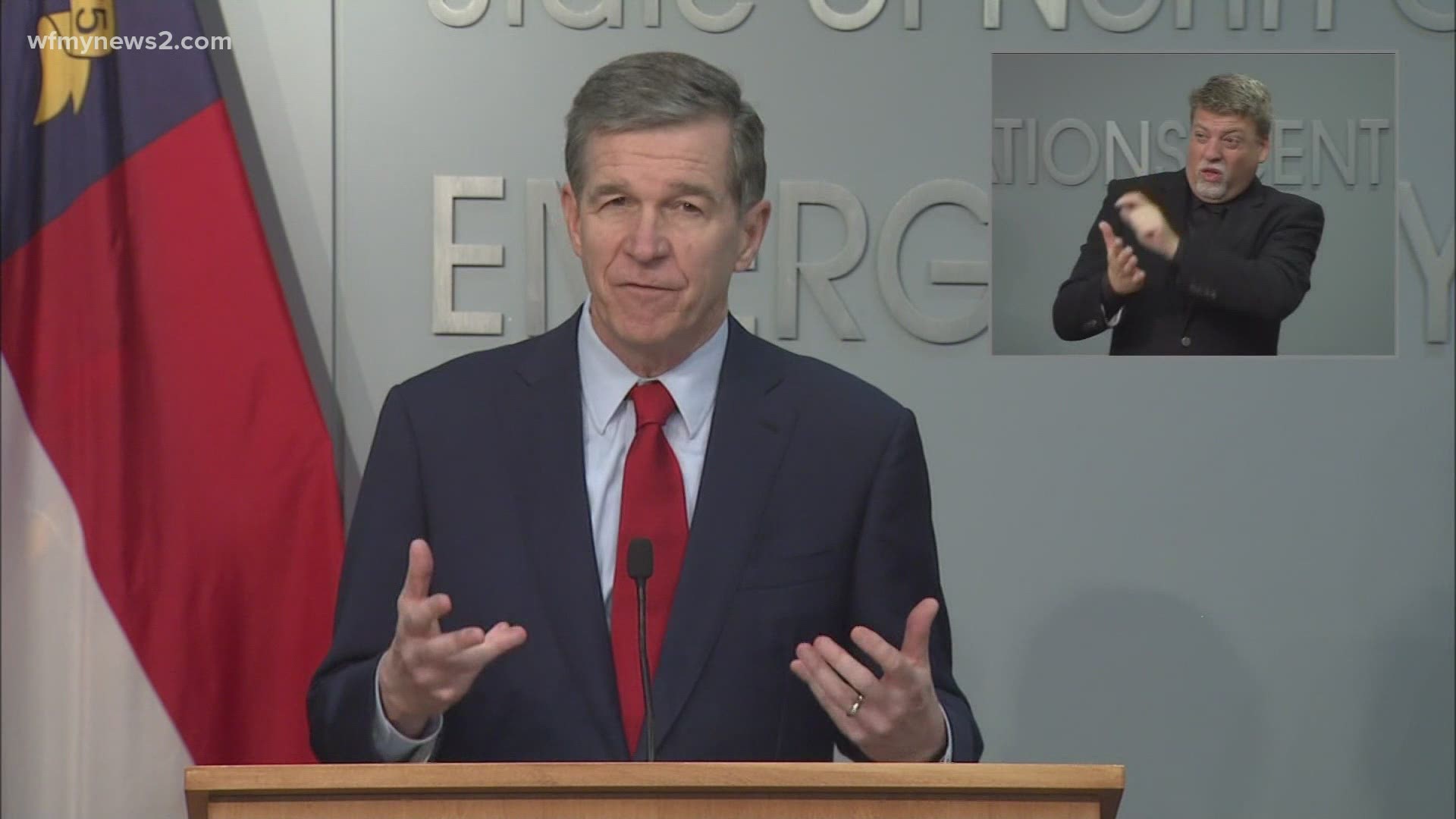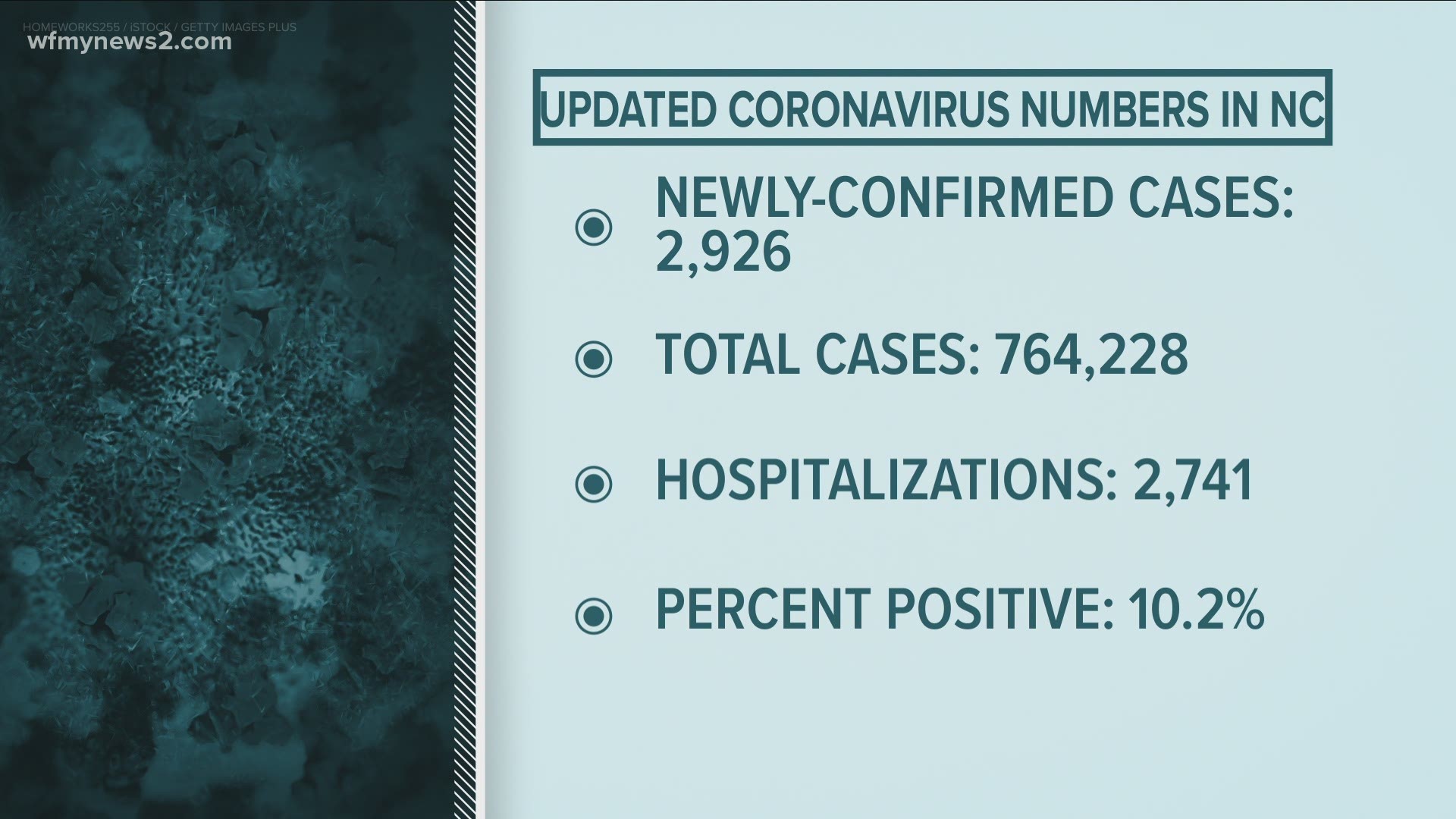NORTH CAROLINA, USA — Gov. Roy Cooper is urging all North Carolina schools to provide in-person learning options for students.
"It's time to get our children back into the classrooms," Cooper said during a COVID-19 task force briefing on Tuesday. "Students who are ready to return to the classrooms should have that chance."
State officials said schools can still offer the option of remote learning.
“Protecting the health and safety of the people of this state, especially our children and our teachers, has been our goal,” said Cooper. “We know school is important for reasons beyond academic instruction. School is where students learn social skills, get reliable meals, and find their voices.
Cooper and NCDHHS Secretary Dr. Mandy Cohen said research in our state has reaffirmed schools are safe for students as long as safety protocols are met. The state released school safety guidelines last summer and updated those guidelines on Tuesday. The guidelines include a Plan A for grades K-5 and a Plan B for grades 6-12.
The biggest difference between the two plans is a strict six-feet apart rule while students are seated at desks. Students K-5 won't be required to sit six-feet apart, but students in grades 6-12 will. Masks will still be required for all students and staff, and social distancing will still be encouraged for all plans.
Cohen also said research continues to show that younger children are less likely to contract and spread COVID-19.
“Even with the thousands of students and teachers attending school in-person across the state, we have seen few COVID-19 clusters in our public schools,” Cohen said. “Our Department will continue to serve our school communities, offering resources and support so we can keep our school doors open.”
North Carolina's COVID-19 data has improved significantly since Cooper's last public briefing. During his last task force appearance, Cooper extended the stay-home order through the end of February.
On Tuesday, the state recorded its lowest daily COVID-19 case count in over a month. Hospitalizations also declined for a seventh straight day.
Guilford County Schools sent out the following statement in response to Cooper's request:
“Our plan has always been to give parents options and to bring more students back into school buildings while doing so in the safest way possible. While GCS is currently educating 20,000 students in-person, the superintendent knows thousands more still desire and need in-person instruction," said Whitney Oakley, chief academic officer.
- Here you can find the information about our reopening plan: https://www.gcsnc.com/domain/18867.
- On page 73 of this document you can find the original re-entry plan which dates back to September.
Winston-Salem/Forsyth County Schools sent out the following statement in response to Cooper's request:
This afternoon Governor Roy Cooper encouraged school districts in our state to reopen and offer in-person learning for all students. The Strong Schools NC Toolkit was also updated today encouraging schools to return to in-person instruction five days per week to the fullest extent possible while still following all public health protocols.
In response to the Governor’s statements and the toolkit updates, WS/FCS Interim Superintendent Tricia McManus said, “Our plan has always been focused on getting all our students in school, as many days as possible. We know students learn best, in person. We are well on our way to alignment with the Governor’s request as our Pre-K to 3rd grade students already have the option to learn in person four days a week. We continue to look at the safest way to get other grades in the school buildings more often. We are committed to making this happen.”
McManus also noted that as of February 22, the remaining high school students in grades, 10,11 and 12 will return to in-person learning. At that time, all WS/FCS students will be operating in Plan B with options for in-person learning and remote learning. She noted today’s updated guidance from the state will help the WS/FCS COVID Planning Team and the Board of Education Special COVID Committee continue updating the district’s plans.
McManus went on to say, “One important part of getting all students back into school safely is having the state join us in our efforts to help our teachers and other employees feel safer by offering them the vaccine. We must adhere to state health guidelines that currently limit access to the vaccine to only those employees over 65 years old. I think if the state will soon grant access to the vaccine, regardless of age, that will really move us toward a successful Plan A implementation.”
In conjunction with the Forsyth County Department of Public Health roughly 200 WS/FCS Employees over age 65 will get round one of the COVID vaccine on Wednesday, February 3, 2021. The district partnered with Novant Health to host a vaccination clinic last week. More than 400 district employees age 65 and over including teacher’s assistants, bus drivers, child nutrition, teachers, and more were vaccinated during that clinic. WS/FCS currently has over 800 employees age 65 and over. In total the district has nearly 10,000 employees including substitute teachers and contractors.
NCAE Responds to decision to resume in-person learning:
“We, as NCAE, have said since the start of this pandemic that educators are eager to return to in-person instruction when it can be done safely. However, without the widespread vaccination of educators and strictly enforced social distancing, it is impossible for many schools to open safely, and for the schools that have been open, they need help,” said NCAE President Tamika Walker Kelly. “If Governor Cooper feels so strongly about resuming in-person instruction quickly, then he should support educators and immediately bring the full weight of his office to bear to get all educators vaccinated by the end of this month, just as 25 other states have been able to do. In the meantime, we encourage local school boards to continue to make decisions that protect students and educators based on local conditions. Particularly in light of the emerging and increasingly virulent strains of COVID, it is more critical than ever to have a flexible approach that can be adapted to whatever situation next emerges.”


